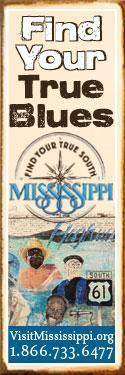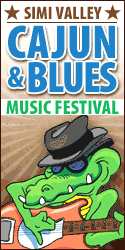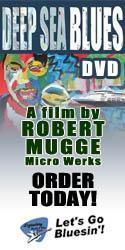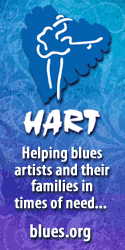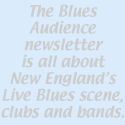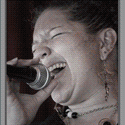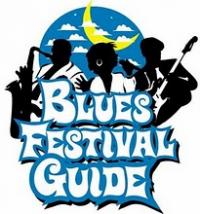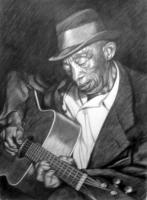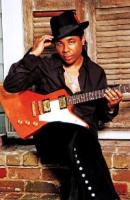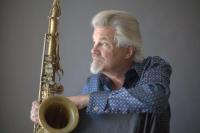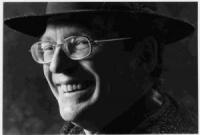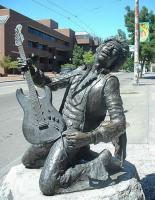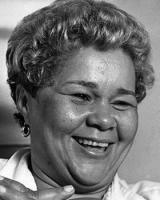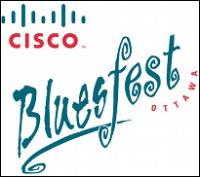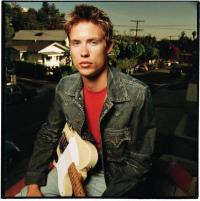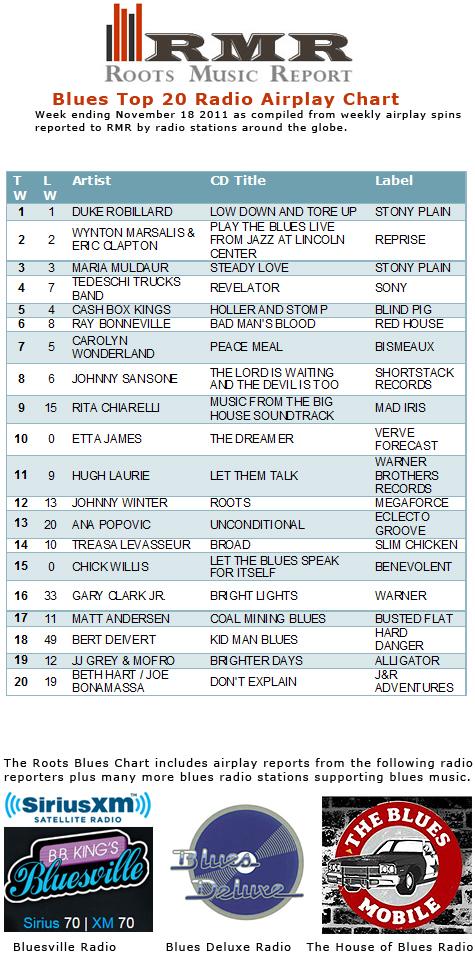|
Unsubscribe
|
 |
|
|
|

|
 |
Attn: FESTIVAL PROMOTERS |
|
Post your 2011 festival info to the Blues Festival Guide Website by following this link:
Yes it's still FREE! Get listed on our Website; our annual Magazine, the E-guide and Facebook. All you gotta do it is take 5 minutes to provide your dates, and your location.
You'd be crazy to miss out. The Website gets 30,000+ unique visitors per month, the Magazine reaches 100,000 hard copy readers, (plus thousands more who view the magazine digitally), Facebook fans exceed 9,000+, and the weekly E-Guide newsletter has 24,000+ subscribers. If somebody is a fan of Blues...we reach 'em.
How's that for FREE!
Post your festival information as soon as you know it. Blues Fans are ready to make their 2011 festival travel plans.
|
|
 |
| JOHN-ALEX MASON : : JOOK JOINT THUNDERCLAP |
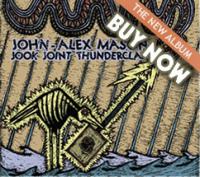 |
John-Alex Mason is a one-man band from the front range of Southern Colorado. His sixth full-length album is set to release 2/15/11. Jook Joint Thunderclap is a world boogie collaboration of master players from Chicagoland, Holly Springs, Guinea and Colorado. On this project Mason added djembe, bolofon, fiddle, mandolin, harmonica, bass and flos to his one-man band of kick drums, electric guitars and vocals.
To recreate his unique and highly danceable sound from Jook Joint Thunderclap for festivals and events, John-Alex prefers to bring a 4-piece including Lionel Young on Fiddle, BMA nominee Gerry Hundt on Mandolin, Harmonica, Bass and Guitar and Fara Tolno on Djembe. The one-man band core does offer great flexibility, however, to fit budget and scheduling constraints playing solo, up to a quartet.
Mason’s bond with Cedric and Cody Burnside continues beyond the studio and they welcome the opportunity to create unique jams whenever John-Alex Mason and the Burnside Exploration (Intrepid Artists) are on the same bill.
Mason loves his fans and loves to play and is therefore always available for radio and press interviews, promo appearances and cd signings. John-Alex endorses Category 5 Amps and National Resophonic Guitars.
Click for more
 |
| GRANA' LOUISE : : GETTIN KINDA RUFF |
|
Internationally recognized Graná Louise has delighted countless music fans around the world with her outstanding blues performances. Her deep, rich voice belts out the kind of raw, gut blues that makes your spine tingle and heart ache. Graná performs at Chicago's hottest blues clubs including Blue Chicago, Buddy Guy's Legends, B.L.U.E.S and The Kingston Mines. She has been a repeat featured act at the Chicago Blues Fest, performing both blues and gospel. Graná has rocked the house at the acclaimed Apollo Theater in New York and festivals from Detroit to Mexico, Reykjavik to the French Riviera, Italy, Austria, Switzerland, Latvia, Germany, Brazil and beyond. Getting' Kinda Rough! combines studio and live recordings, brand new original songs and covers that have been personalized so as to make them her own.
Click for more
 |

|
| |
Cain: Able Bluesman
|
|
February 23, 2011
Chris Cain sings the praises of Gary Smith. "Gary was the first guy I know of who had a radio show way back that played special things that you wouldn't hear on a normal show. Inside stuff. He's been a mentor to a million cats that have played in bands he's had. I'm not trying to put him out to pasture, but I think they should give him a lifetime achievement award."
Cain was raised in a musical household. His parents had a vast and varied record collection. His father was steeped in the blues, having grown up on Memphis' famed Beale Street.
"I was lucky," Cain said. "Whenever somebody big would come to town, we would always go see them. Every time B.B. King or Ray Charles came, we never missed it. All that afternoon, my dad would be playing their records, getting primed for it. Even as a kid, I knew it was something special."
When Cain was 8, his father showed him how to play Big Joe Williams' "Baby Please Don't Go."
"Basically, anybody that my mom and dad loved, I would try to play like. If I hear they like Albert King, then I'm all over that, so my dad would say, 'Hey dude, that sounds just like Albert King!' That was what I lived for. I would stay in my room and try to get that stuff down, to get the a-OK from those two."
By his teens, Cain was performing professionally.
Cain, 53, makes the most of every moment on stage. "I worry about every little aspect of every performance. I just want it to be as good as it can be. Sometimes I'm a pain in my own ass."
|
Shemekia: I am Blues
|
|
February 23, 2011
If it was up to her, Shemekia Copeland would have never even gotten on a stage. Lucky for her — and thousands of blues fans — she had no choice.
Copeland, who was born in Harlem and lived in the Poconos before moving to Chicago, tells the story of how her father Johnny Copeland, a blues guitarist, forced the matter.
“My dad saw me sitting in the audience, and he started playing a song we used to sing around the house,” she recalls. “And he called me up on stage. I thought I was being punished. Now it’s my favorite part of the business, being on stage in front of people.”
Copeland has opened for The Rolling Stones, headlined major blues festivals and been heralded as the heir apparent to Ruth Brown, Etta James and Koko Taylor, but for the big-voiced singer, the goals have been broad and simple.
“In my whole career, my main goal has always been to help blues music develop and grow,” she shares. “A lot of people get into the blues music, then the second they do well, they leave it and switch to whatever they wanted to be in the first place.”
Coming of age around the blues, thanks to her dad, had “a huge impact” on that outlook, says Copeland.
“I grew up in the middle of Harlem during the hip-hop era,” she says. “So if my dad was not a blues musician, I probably would have never heard blues, and I’m so grateful for that, because blues is me, and I am blues. It’s in my soul. It’s who I am.”
|
Singer Island Saxophonist Played with Some Legends of Blues Music
|
|
February 23, 2011
Terry Hanck left his native Illinois for California in the early '60s, enticed by the warm weather and towering waves.
Hanck, now 66 and living in the Singer Island section of Riviera Beach, decided the sport of surfing was not a long-term career opportunity and instead turned to music.
In 1970, Hanck formed his own band in Berkeley, Calif. Seven years later, he began playing with legendary blues musician and songwriter Elvin Bishop. He performed with Bishop for 10 years before going back full-time to his band.
"Music starts in one place, and it then takes you all over the place," Hanck, who has been nominated twice for a Blues Music Award, said of his music career. "A lot of times you start something out, and you end up going in a lot of different places. I've always felt an affinity toward music."
Hanck, who has one son and two grandchildren, performs with his California-based band at venues throughout the country. They recently completed a three-week tour of Palm Beach County.
"There are great musicians here," he said. "The local music community has been very welcoming."
|
BB King's Blues Club in Vegas Files For Bankruptcy
|
|
February 19, 2011
B.B. King's Blues Club on the Las Vegas Strip has filed for bankruptcy.
The Las Vegas Sun reports that the club's owner, Beale Street Blues Company Las Vegas LLC, filed for Chapter 11 reorganization of the restaurant and live music club at The Mirage hotel-casino on Wednesday.
The club hopes to restructure $3.7 million in debt and other liabilities. It generated sales of $8.6 million in 2010 and $1.1 million so far this year.
The venue is part of a Memphis-based group of clubs named after the music legend. King is not named as an officer in the company.
|
L.B. Landry High School Gets Visit From Thelonious Monk Institute
|
|
An hourlong assembly on Tuesday morning took the students of L.B. Landry High School in Algiers on an enthusiastic, loud and expressive journey through the evolution of blues, jazz and hip-hop music. The event was held in celebration of Black History Month. Students and teachers danced in the aisles to the rousing music of some of the best in the business as part of the Thelonious Monk Institute of Jazz’s national “Jazz Across America Tour.” “Our goal is to reach as many kids as possible,” said the institute’s chairman of the board Thelonious Monk Jr. The other goal, he said, is to make the connection between the popular songs the students listen to today and the historical roots of that music. The program, he said, is designed to “connect all the dots for the kids.” While sometimes the genre of “jazz” can be portrayed with a narrow scope, he said, “It’s not separate—it’s all part of a continuum of African-American history. We have to illustrate the connective tissue for our students.” People know jazz is important, he said, but often have trouble articulating just why it is so important to the history of American music. The event was held in celebration of Black History Month. Grammy Award winning blues artist Chris Thomas King took the students through the blues, from the single guitar sounds of the 1930s Delta blues, to the accompaniment of drums, keyboard, bass and saxophone, to the electrifying of the blues in the likes of Muddy Waters. King delighted the crowd with a few notes played with his teeth. Behind an infectiously sweet smile and humble demeanor, King, who grew up in Baton Rouge, has sold more than 10 million records. In addition to several other films, in 2001 King appeared in “O Brother, Where Art Thou,” as a bluesman who supposedly sold his soul to the devil in exchange for his guitar skills. Women sing the blues too, “tour guide” and nationally renowned vocalist Lisa Henry illustrated with a Big Mama Thorton-inspired rendition of “Houndog.” Henry kept the students involved with an exchange of lyrics between her and the audience.
|
Perspectives: Blues Society Grew Out of a Love of Music
|
|
February 19, 2011
Webster's defines the blues as "black folk music characterized by minor harmonies, typically slow tempo and melancholy words."
Cobbler John Bolen would agree.
"It's a celebration of black music. What makes our music so different from Europe and other countries is the influence of our African-American population," he said. "They've contributed so much, from the songs to the instruments and style - string bending and the percussive beat."
Bolen, 63, is president of the local Blues, Jazz & Folk Music Society Inc..
He believes most American folk music is rooted in the blues, including zydeco, early country and even bluegrass.
Living in New Jersey, Bolen became enamored with the late 1950s and early 1960s folk music revival going on across the bay in New York City.
"Folk encompasses all types, and I'm really into that roots kind of music," he said.
So it's not surprising that, after moving to Marietta where he ran a shoe repair business for 33 years, Cobbler John became involved with a group of fellow music-lovers who founded the Blues, Jazz & Folk Music Society.
"This area needed something besides more country and rock music, so when I heard the Society was forming, I thought, 'that's something I want to be part of,'" Bolen said. "(The late) Dr. Keith Gatto, who was also from New Jersey, started it in 1987, and Moon (Michael Mullen) was the Society's vice president."
|
Breaking Every Stereotype
|
|
February 19, 2011
Described as 'one of the best and brightest guitar heroes performing in the world today,' Oli Brown plays the blues - and couldn't be happier. Despite the traditional job description, you don’t really have to be elderly, black and down in the dumps to create scintillating blues. At least, not if you’re Oli Brown, a 21-year-old British guitar phenomenon who’s been turning the blues world on its ear over the last couple of years. Not a shabby achievement, considering that he didn’t pick up a guitar for the first time or hear any blues music until he was 12 years old.
“I started having 20-minute guitar lessons with a music teacher from school,” said Brown from his home in Sco Ruston, a hamlet near Norfolk, about two hours away from London. “The first song I learned was the James Bond theme tune. I stayed up all night learning it. I just loved it and didn’t look back from there. That sense of achievement I got when I learned that song, I knew it was what I wanted to do in life. It made me so happy.”
It’s also cocked the trigger of a lot of other people who have heard or seen Brown perform.
Not since the early days of Eric Clapton’s career, when his white man plays the blues prowess prompted 1960s disciples to scrawl “Clapton is God” graffiti in London, has a young English star in the making with a prototype tall, thin and long hair rocker appearance and magnetic stage presence displayed such a natural affinity for the American- born art form.
“The hottest young pistol in British Blues,” crowed UK rock journal Mojo, while another magazine, Classic Rock, deemed him “one of the best and brightest guitar heroes performing in the world today.”
|
Art & Soul: Beach Institute Exhibit Plays the Power of the Blues
|
|
February 19, 2011
Growing up in Athens, artist Rik Freeman always loved a good story.
"Whether read or heard, I've always been able to visualize these stories," he said. "I would 'overhear' grown folks' conversations and feel their emotions, read a book, listen to music and there's a movie going on in my head. This fueled my artistic style as a narrative painter, a storyteller, a Griot with a paintbrush."
"The Chittlin Circuit Review," a solo exhibit of Freeman's narrative paintings inspired by blues music, is on display at the Beach Institute in Savannah, offering a dizzying, dazzling dose of African-American stories. More than two dozen oil paintings depict life along the Chittlin Circuit, a string of theaters where African-American entertainers performed during the segregated Jim Crow era.
Each composition celebrates the physical, creative and spiritual power of music, focusing upon the artists who make music, as well as the patrons who find liberation and salvation on the dance floor. Freeman, who is best known as a muralist in Washington, D.C., finds creative expression in oversized canvases measuring as large as 7-by-9 feet.
"The people he focuses on are telling their own life story," said Darlene Wilson, program coordinator at the Beach Institute. "Despite all their hardships and challenges, they still celebrate through their music."
|
Mother India’s Floors
|
|
In 1950, looking for a place to build a studio away from central Mumbai’s booming industrial hubs, film-maker Mehboob Khan found a remote plot of land. It was closer to Mumbai’s southern and central districts, where stars, film-makers and producers traditionally lived, than the far-flung north-west of the city, where Filmistan and Bombay Talkies had their already-historic studios located in Goregaon and Malad—a place that Saadat Hasan Manto would describe years later to his readers in Lahore as a “village outside Bombay”.
In December 2009, industrialist Anand Mahindra floated the idea of a blues festival that would bring the world’s biggest artistes together every year under the Mahindra banner. With Jay Shah, project lead, Mahindra Blues Festival, he discussed several possible locations where they could do for the blues what Montreux (Switzerland, home of the annual Montreux Jazz Festival) does for jazz.
“We wanted a location with which we could build an association over time, a place that could come to be thought of as the hub for blues music outside its country of origin, the US. We thought of Goa, Bangalore, a number of other places within India,” Shah recalls. “But in the end we felt that the blues, with its history as a music of struggle and celebration, could only really belong to Mumbai.”
It isn’t until you step on to one of the stages that Mehboob Studios offers you an opportunity increasingly rare in Mumbai: to be overwhelmed by space. Even in present-day Bandra, where public spaces tend towards bonsai proportions, an empty film studio is cavernous.
This is also why Anish Kapoor, who held his Mumbai art show here in November-December, found Mehboob’s Stage 3 the most congenial space for the pure abstraction of his sculptures. “It’s always been a space where things are made, but from which they emanate,” Kapoor said about the location. “Nobody ever came here. We’ve been able to turn it the other way around and bring the public into this space.”
|
Jonny Lang Had His Big Break at Age 15 and Hasn't Looked Back
|
|
February 24, 2011
Last year, blues musician Jonny Lang released "Live at the Ryman," his first recording that captures the electrifying energy of his performance on stage.
Recorded in the summer of 2008 at Nashville's premier venue, the 12-cut disc showcases the youthful vitality of the still smokin' 30-year-old who burst onto the national music scene with his debut major label recording "Lie To Me" at the tender age of 15.
Blues fans were stunned to hear the youngster's fiery guitar playing that showcased a talent that seemed to be already mature enough to rival a fully realized blues master.
Like child actors who impress at a young age, Lang had his work cut out for him to maintain and support such lofty praise as he grew to adulthood.
Subsequent recordings were hit and miss, but he kept at it, further developing his own voice and songwriting skills to reflect who he was as a person, and that communicated his own innermost thoughts and demons, a preordained requisite for anyone to claim authenticity and credibility as a true bluesman.
"In my own life, music has been such a powerful force, and I know that's the case for a lot of people," he said in the record's promotional material. "I've seen how music can give people the strength to change. After years of witnessing that, it's become more of a focus for me to write songs that really count."
In his 15 years on the road, Lang has toured with the Rolling Stones, Buddy Guy, Aerosmith, B.B. King, Blues Traveler, Jeff Beck and Sting.
In 1999, he was invited to play for a White House audience, including President Bill Clinton and Hillary Clinton. He made a cameo appearance in the film "Blues Brothers 2000" as a janitor.
|
Blues Pioneer Jimmy Reed Honored at Dominican
|
|
February 23, 2011
The life and music of 1950s Chicago electric blues pioneer Jimmy Reed was the focus of Dominican University’s third Blues and the Spirit symposium February 15. The symposium screened “The Jimmy Reed Experience” a new documentary by Chicago broadcast journalist and Columbia College professor Steve Lattimore. Following was a panel discussion of Reed’s life and legacy and the problems of copyright infringement among 50s-era African American recording artists. Then family and friends gathered in Dominican’s Parmer Hall for a concert tribute to Reed’s music.
Jimmy Reed’s guitar playing was hypnotically simple. His squeaky harmonica playing and “mushy-mouth” vocals have been copied by musicians since the 1950s. Reed’s “everyman” lyrics generated a large following among both black and white radio audiences. Eighteen of Reed’s blues songs were Top 20 R & B Billboard hits in the 1950s and early sixties , including “Ain’t That Lovin’ You Baby” “Big Boss Man” “Bright Lights Big city” and “Take Out some Insurance on Me Baby” and “Goin’ to New York.” Several of his songs crossed over into the Billboard top 100.
“He was a favorite of disc jockeys,” said panelist WBEZ host Richard Steele. “We liked to play his songs. It was like—let me hear that again. He was so unique in his sound. Everybody could relate to him.””
U.S. Armed Forces Radio in the 1950s and early sixties introduced Reed’s songs to members of British bands such as the Rolling Stones, Yardbirds, Beatles and Van Morrison. These bands, in turn, recorded, repackaged and resold American roots music back to American teenagers. During a mini-blues revival in the early sixties, Reed toured the country playing at blues festivals and even Carnegie Hall.
Reed was a hard drinker. He was not diagnosed with epilepsy until the late sixties because he and doctors mistook his fits for delirium tremons. He died of epilepsy at age 51 in 1975. Reed was inducted into the Rock and Roll Hall of Fame in 1991.
Reed–who was illiterate—was also a victim of exploitation and copyright infringement. He never received fair payment for his songwriting royalties which are significant–even Elvis covered “Big Boss Man.” After his record label, VeeJay records, went broke, ARC music – owned by Chess Records – bought the music publishing rights for Reed’s songs. The James and Mary Reed Foundation – started by Reed’s children — sued ARC for $18 million in 1996 and are still awaiting a judgment, according to his son, Jimmy Reed, Jr.
Three of Reed’s eight children were present for the panel, as well as Lonnie Brooks, Cookie Taylor Threatt–daughter of Koko Taylor– Bluesman Willie Dixon’s widow, Marie, Chuck Barksdale–one of the original members of the Dells– Blues historians David Whiteis and Fernando Jones, Oak Parker and Columbia College professor George Baily, deejay Richard Steele and entertainment lawyer Jeff Arena.
|
Native Americans Show Handmade Instruments at Music Industry Convention
|
|
February 22, 2011
A blues band rocks the stage in the Native American Pavilion at the recent NAMM Show at the Anaheim Convention Center. A handmade native drum set is center stage, adding a traditional component to the blues. This is the first time ever that the giant NAMM Convention for music industry professionals has included a pavilion for Native American music and instrument makers.
The walls of the small room are lined with tables showcasing drums, flutes and even electric guitars.
Flute and drum maker – and native flutist – Alex Maldonado breaks out a binder that shows how he makes the hides for his drums at his Arizona home. "I get it as basically fresh meat, you know," Maldonado says as he points to pictures in the binder. "And I have to put it on a rack and clean it off. That’s washing all the mud off it and, you know, manure and stuff."
Maldonado has been making drums by hand for about 15 years. That’s his set on stage at the NAMM Native American Pavilion.
He started with flute making two decades ago after a surreal experience at a truck stop when he was a truck driver.
"I hear this flute playing in Oregon in a deserted rest area and I stayed there I figured five minutes and it ended up being two hours. And the next thing you know, I was hooked," Maldonado remembers.
He says his brother reminded him that their uncle had taught them how to make flutes as kids.
Maldonado used that childhood knowledge as a jumping off point to build a business selling handmade and hand-painted flutes, drums and gourd shakers at Indian markets.
He says NAMM, which is aimed at mainstream musicians, was a totally different experience.
|

Bruce Iglauer interview: 40 years of Alligator Records
February 16, 2011
Bruce Iglauer started Alligator Records in 1971 because Hound Dog Taylor’s music gave him no other choice. If he didn’t do it, who would?
That imperative – the sense that the world must hear this, right now – guides Iglauer to this day. He has put out more than 250 albums by some of the pivotal blues artists of the last 40 years, including Koko Taylor, Albert Collins, Lonnie Brooks, Johnny Winter, Son Seals, Luther Allison, Corey Harris, Mavis Staples and Shemekia Copeland.
At his office in the three-story Alligator building on the North Side, he remains undeterred by a business that has dealt him his share of heartache: several of his closest friends, most recently the great blues singer Koko Taylor, have died; the record business has been in a decade-long economic decline; and the blues is a mere sliver of the U.S. music market, representing less than 1 percent of its sales.
Yet Iglauer remains an enthusiast, a vigorous advocate for the blues who runs his label with an energy that can verge on manic. He puts in long days, doing everything from producing records and listening to demos to assisting artists who need help paying bills and drumming up overseas business. He is currently exploring a licensing deal with a Shanghai media conglomerate to bring Alligator recordings to China. With a staff of 15, Iglauer’s Alligator Records remains a blues cornerstone, a $2 million a year business that dispenses $500,000 in royalty checks to artists annually. “I run this business with the knowledge that the grandchildren of Hound Dog Taylor are counting on me to make smart decisions,” he says, sitting next to a coffee table brimming with stuffed alligators (the label was named after Iglauer’s habit of clicking his teeth together in time to music) and a pyramid-shaped Blues Foundation trophy awarded to the imprint for “Keeping the Blues Alive.”
back to top
|

Society Offers Musical Donation
February 21, 2011
Nanaimo students can enjoy the sound of music, thanks to a donation to purchase instruments for a school music program.
The Nanaimo Blues Society donated $2,500 to the Nanaimo-Ladysmith Schools Foundation. The contribution allows Park Avenue Community School to buy instruments for its music program.
The donation bought a base xylophone, bass metallophone, alto metallophone, alto xylophoe, soprano xylophone, drum and extra mallets.
The Nanaimo Blues Society officials said they chose to donate money to buy instruments for students at an elementary-school level because the positive impact music can create affects the greatest number of children.
The Nanaimo Blues Society is also donating an additional $500 to Departure Bay School to purchase two guitars for students who cannot afford the rental fees.
back to top
|

SHARON JONES AND THE DAP KINGS: 
Sharon Jones is in the House this week, to talk about soul music in the 21 st Century. She has some tales to tell, about her life as a prison guard and her obsession with James Brown. Elwood will spin some Dap Kings for you, from I Learned The Hard Way, and play soul music old and new, including Aretha Franklin, Otis Redding, Amy Winehouse, and James Brown. This week’s blues breaker is brand new music from Roomful of Blues. And there’s a chance for a lucky listener to win the new CD from harp legend John Popper of Blues Traveler – his new project, John Popper and the Duskray Troubadors. For a list of stations where you can find House of Blues Radio
|

|

|
| Click on festival name to click through to festival website. |
VISIT THE BLUES FESTIVAL GUIDE WEBSITE FOR ALL THE FESTIVALS
Over 500 festivals are listed on the website www.BluesFestivalGuide.com |
Calgary Mid-Winter Blues Festival
Monday-Saturday,
February 21-26
Calgary, Alberta, Canada
www.calgarybluesfest.com
|
Sighisoara Blues Festival
Thursday-Saturday,
February 24-26
Sighisoara, Sighisoara, Romania
www.blues-festival.ro |
Saskatoon Blues Festival
Thursday-Sunday,
February 24-27
Saskatoon, SK, Canada
www.saskatoonbluessociety.ca |
Phuket International Blues Rock Festival
Friday-Saturday,
February 25-26
Karon Beach, Phuket, Thailand
www.phuketbluesfestival.com |
Colorado River Music Fest
February 26
Parker, Arizona, U.S.
www.coloradorivermusicfest.com |
Dry Bones Blues Festival, VI
Saturday, March 5
St.Paul, Minnesota, U.S.
festival link |
Mississippi BluesFest
Saturday, March 5
Greenwood, Mississippi, U.S.
www.mississippibluesfest.com |
Centenary Mini-Blues Festival
Friday-Saturday,
March 11-12
Hackettstown, NJ, U.S.
www.centenarystageco.org |
Bonita Blues Festival
Friday-Saturday,
March 11-12
Bonita Springs, FL, U.S.
www.bonitablues.com |
Costa Rica Blues Festival
Saturday, March 12
San Jose, San Jose, Costa Rica
www.crbluesfest.com |
St. John Blues Festival
Wednesday-Sunday,
March 16-20
St. John, U.S. Virgin Islands, U.S.
stjohnbluesfestival.com |
2011 Texas Bluesfest-Corpus Christi
Sunday, March 20
Corpus Christi, Texas, U.S.
www.TexasBluesfest.com |
International "Blues & Arts Fiesta"
Saturday, March 26
San Felipe, Baja Norte, U.S.
www.bluesandarts.com |
Giving Hunger The Blues
Sunday, March 27
Sarasota, Florida, U.S.
www.givinghungertheblues.org |
|
 |
RBA Publishing Inc is based in Reno, NV with a satellite office in Beverly Hills, Florida. We produce the annual Blues Festival Guide magazine (now in its 7th year), the top-ranking website: www.BluesFestivalGuide.com, and this weekly blues newsletter: The Blues Festival E-Guide with approximately 20,000 weekly subscribers. We look forward to your suggestions, critiques, questions, etc.
Reach the E-Guide editor, Gordon Bulcock, gordon@bluesfestivalguide.com
or contact our home office at 775-337-8626, eguide@bluesfestivalguide.com
back to top
back to top
|
| Information - both editorial and advertising - in the Blues Festival E-Guide - is believed to be correct but not guaranteed - so check it carefully before you attend any event or send money for anything. We do not write the news... just report it. |
|
|
|
| |
|







